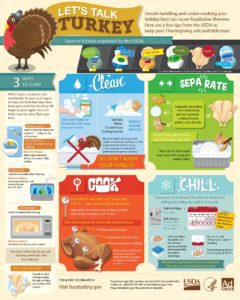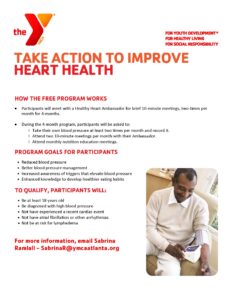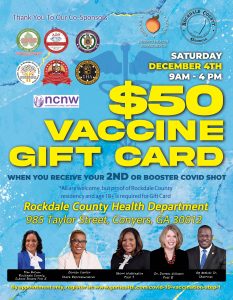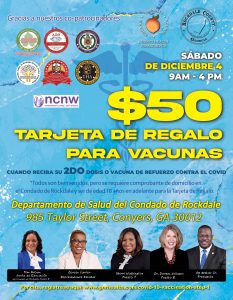The holidays offer a perfect opportunity for enjoying loved ones, celebrating life, being grateful, and reflecting on what’s important. They are also a time to appreciate the gift of health. Support health and safety for yourself and others by following some timeless tips for staying healthy.
Know Your “Bugs”
Aside from being on guard against COVID-19, two common illnesses that often strike during the holidays are Influenza (the flu) and Norovirus. Another type of “bug” that can be found during the holiday season is Salmonella infections. The information below will give you a good start on keeping your holidays healthy by preventing these illnesses.
Influenza (the flu)
Influenza (the flu) is a contagious respiratory illness caused by the influenza viruses. It spreads between people and can cause mild to severe illness. In the United States, flu season normally occurs in the fall and winter, but individuals can be infected with influenza year round.
One of the best ways to protect against flu is to receive a flu shot. And it is not too late to get one. Flu shots are available at our Health Department locations. Flu season has already begun in Georgia, and it typically peaks in February and can last as late as May.
How do you know if it’s the flu? What can you do to care for someone with the flu? Click here for more information.
Norovirus
Norovirus is a gastrointestinal illness that generally causes vomiting and diarrhea. You may hear people refer to it as the “cruise ship illness” or “stomach flu,” but norovirus is not related to the influenza virus (flu), which is primarily a respiratory illness.
Hand washing is the best way to protect you and your family against most illnesses, including norovirus. Hand washing is preferred as alcohol-based hand cleaners are not effective against some germs, including norovirus.
Soiled clothing and linens should be washed as soon as possible with detergent in hot water and/or dried using a hot cycle. Many common cleaning agents are not effective against norovirus. Read the labels and follow manufacturer’s instructions for best results. Chlorine bleach solutions are an inexpensive and effective way to clean and disinfect contaminated surfaces.
Chlorine bleach concentrations and mixing instructions:
- For stainless steel, food/mouth contact items, toys
- 1 tablespoon of bleach in 1-gallon water
- For non-porous surfaces, tile floors, counter-tops, sinks, toilets
- 1/3-cup bleach in 1-gallon water
- For porous surfaces, wooden floors
- 1 cup bleach plus 2/3-cup bleach in 1-gallon water
Click here for more information on Norovirus and what to do if you or someone you know has it.
Salmonella
Salmonella are bacteria that can make you sick and cause an infection or serious illness. Salmonella can be found in a variety of foods and can be hard to identify as contaminated foods usually look, taste, and smell normal. The bacteria can also be spread through contaminated water, the environment, other people, and animals.
Centers for Disease Control and Prevention list a multitude of foods that can be contaminated with Salmonella such as chicken, turkey, beef, pork, eggs, fruit, sprouts, other vegetables, nut butters, frozen pot pies, chicken nuggets, and stuffed chicken entrees. (Centers for Disease Control and Prevention, 2021)
Symptoms of Salmonella include diarrhea, fever, and stomach cramps and can start between 6 hours and 6 days after infection. While many people recover without antibiotic treatment in 4 to 7 days, some people that experience severe diarrhea may need to be hospitalized or take antibiotics. Click here for more information on Salmonella and what to do if you or someone you know may have been infected.
To safely prepare your food and help prevent Salmonella infection, follow the Clean, Separate, Cook, and Chill guidelines:

Stop the Spread
Wash Your Hands
Washing your hands is one of the most effective ways to prevent the spread of germs.
- Wash your hands often with soap and warm water for 20 seconds.
- If soap and water are not available, use an alcohol-based hand rub.
Food Safety
From finger foods to turkey and dressing, there is never a time of year when food is more of a focus than over the winter holidays. Some foodborne illnesses can be spread from person to person. Don’t handle or prepare food if you are sick. Reduce your chances of a foodborne illness by remembering these simple steps for food preparation: wash hands and surfaces often, avoid cross-contamination, cook foods to proper temperatures, and refrigerate promptly.
For more information about safe food preparation, visit:
Sources:
https://www.cdc.gov/foodsafety/communication/salmonella-food.html#four-steps






